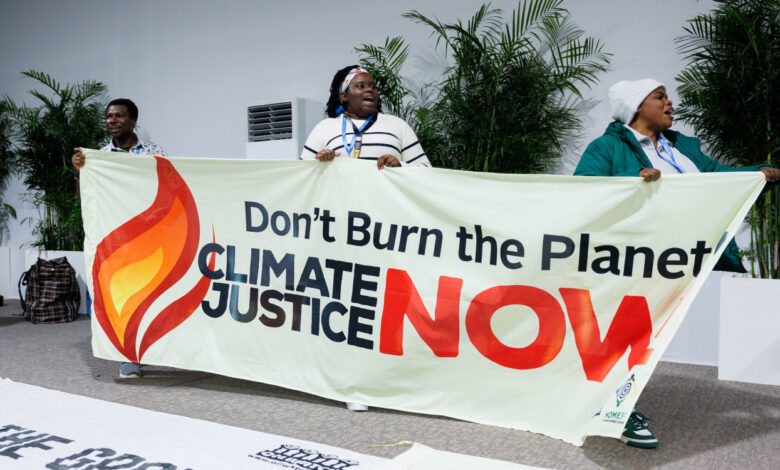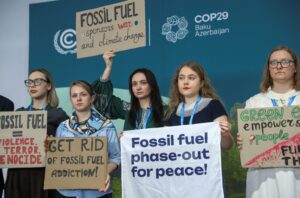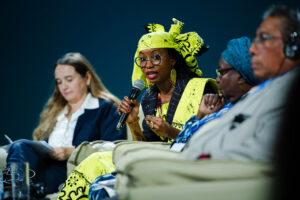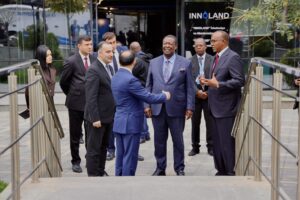COP29: Climate Experts Slam $250bn Finance Proposal as “An Insult to the Global South”
If Historic Polluters Fail to Act, Access to Strategic Minerals and Markets May Be Restricted as Developing Nations Leverage Economic Power to Drive Climate Action for Humanity's Survival

Baku, Azerbaijan, Nov 22 — On the final day of COP29, frustrations boiled over as African delegates, activists, and global civil society organizations sharply criticized the latest draft of the New Collective Quantified Goal (NCQG) on climate finance. The proposed $250 billion annual target by 2035 has been described as “a slap in the face” and a failure to address the dire climate realities faced by vulnerable regions like Africa.
For African nations, including Kenya and Uganda, the figure is a stark disappointment. It falls far short of the $1.3 trillion annually they had collectively demanded to address adaptation, loss and damage, and energy transitions. They argue that the new proposal fails to reflect the severity of the crisis and the resources required for meaningful action.
“Our expectations were low, but this is a slap in the face,” said Mohamed Adow, director of Power Shift Africa. “What trick is the presidency trying to pull? They’ve already disappointed everyone but have now angered and offended the developing world. We need developed countries to grab the bull by the horns and put forward a number that reflects the actual needs of developing countries.”
Greenpeace Africa joined the chorus of disapproval, demanding immediate revisions to the NCQG text and concrete action to ensure that the commitments made translate into real impact.

Fred Njehu, Pan-African Political Strategist at Greenpeace Africa, said “The latest NCQG document is a missed opportunity to decisively make polluters pay for the destruction they have caused and falls short of expectations from developed countries. While the principle of ‘polluter pays’ is mentioned, there are no enforceable mechanisms to ensure that fossil fuel corporations contribute to climate action. The voices of 10,000 Africans who signed our petition demand real action, not just acknowledgments, bracketed texts, and unagreed options without actual figures.”
Although, the $250 billion annual target doubles the current $100 billion goal, however, according to climate change advocates, remains a fraction of the estimated $5–6.8 trillion needed until 2030 to address the impacts of climate change. African negotiators highlighted the scale of the adaptation and mitigation finance gap, which requires $215–$387 billion per year for adaptation and up to $894 billion annually for loss and damage.
The text also proposes that the $250 billion comes from a mix of public and private financing, a point that has frustrated developing nations. They have long demanded that a significant portion of climate finance come as direct grants from governments rather than loans mobilized through multilateral development banks (MDBs).
“This $250 billion from developed countries is a disgrace,” said Harjeet Singh, Global Engagement Director at the Fossil Fuel Non-Proliferation Treaty. “Developed countries are fully aware of the importance of climate action, yet they have the audacity to offer this paltry amount. They are saying that MDBs will provide the funds, which means more loans. There is no reference to grants, which means no commitment that climate funds will be provided in non-debt-inducing forms.”
Environmental activists representing nations grappling with severe climate impacts including from Kenya and Uganda expressed outrage at the lack of ambition in the proposal.

“Is it a joke?” referring to the earlier rumors of a $200 billion target. “The proposal is not just disappointing; it actively undermines trust in these negotiations,” said Fadhel Kaboub, a senior advisor at Power Shift Africa.
Activists have also voiced their anger, accusing developed nations of failing to live up to their historic responsibilities. Namrata Chowdhary, Chief of Public Engagement at 350.org, stated, “We need $1.3 trillion, and every subtraction of the money is a betrayal of the Global South…Any ambition we talked [about] in the morning is missing.”
Greenpeace Africa highlighted several positive aspects of the NCQG draft, including the recognition of systemic barriers to accessing finance and the need for grant-based adaptation funding. However, these acknowledgments were overshadowed by a lack of enforceable commitments. Dr. Lamfu Yengong, a Forest Campaigner at Greenpeace Africa, warned that without clear targets and mechanisms to mobilize adequate financing, the adaptation finance gap would continue to grow, leaving vulnerable communities at greater risk.
“African communities are on the frontlines of the climate crisis, yet the ambition on climate finance commitments is inadequate,” Yengong said. “This is unacceptable, given the dire climate impacts already faced across the continent.”
The discontent over the NCQG proposal reflected broader frustrations with the COP process. Civil society leaders called for African nations to stand united and reject the text unless meaningful revisions are made.
“What the Global North is offering is not just a joke; it is an insult to all the delegations present at COP29 and symbolizes how unserious they are about the climate crisis,” said Kaboub. “If the historic polluters of the global minority do not get serious about their responsibilities, then we may have to start restricting access to our strategic minerals and our markets, and start leveraging our collective economic weight to save the planet for all of humanity.”
As diplomats raced to finalize the NCQG text, activists and African negotiators warned that failing to address the concerns of the Global South risked derailing future climate talks. Many have called for stronger commitments, particularly on non-debt-inducing finance and a clear framework for enforcing the “polluter pays” principle.
“We join civil society, communities, and movements to condemn the text, to condemn the developed nations,” said Gerry Arances, Executive Director of the Centre for Energy, Ecology, and Development. “Who comes with that kind of face and shows up here, claiming to head climate leadership? Is that climate leadership? We will not allow communities in the Global South to be dictated to by these rich nations.”

As African delegates prepared to leave Baku, on Friday, afternoon, November 22, their disappointment over the outcomes of COP29 was evident. However, the resolve to push for climate justice remained strong. They said the NCQG proposal had laid bare the gap between rhetoric and reality in the global response to the climate crisis, reinforcing the urgent need for equitable solutions.
The results of COP29 left many observers questioning whether the international community was genuinely committed to tackling the climate emergency or merely offering empty reassurances to the Global South. For East Africa and the broader continent, the quest for meaningful climate action will continue with renewed resolve.
Greenpeace Africa demanded immediate revisions to the NCQG draft. They highlighted the critical need for commitments to phase out fossil fuels, reduce subsidies for these resources, and introduce enforceable mechanisms for the “polluter pays” principle. The organization also emphasized the importance of providing guaranteed, non-debt-inducing climate finance to support vulnerable communities.
Climate change activists said this was not the time for vague texts and half-measures. “The adaptation finance gap is growing, and without bold action, it will leave millions of Africans at risk,” they said. These sentiments reflected the broader frustration among African delegates and civil society groups, who viewed the NCQG text as insufficient to meet the continent’s pressing climate challenges.